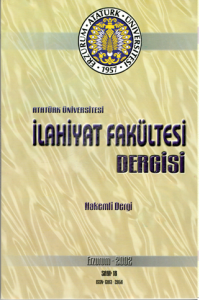İSLÂM BORÇLAR HUKUKUNDA İRADEYİ SAKATLAYAN SEBEPLER II - İKRAH / Causes That Damages Decree in Contract Laws II - Disgust
Abstract
ÖZET
İkrah, bir kimseyi tehdit etmek suretiyle hukuken yapmakla
mükellef olmadığı bir isi yapmaya zorlamak demektir Bu durumda mükreh serbest bırakıldığında razı olmayacağı bir işe zorlanmaktadır. Bu esnada irade ile beyan arasında bir uygunsuzluk söz konusu değildir. Ancak kişi korku nedeniyle sakat bir iradeye sahip olmaktadır.
Çoğunluk alimlere göre zor altında söylenen sözlerin hukuki
açıdan bir değeri yoktur. Bu sözler geçersizdir. Cumhurun bu görüşü daha tutarlıdır. Çünkü mukabil görüş istismarlara yol
açabileceğinden olumsuz sonuçlar doğurabilecektir. Türk Borçlar
Hukukunda da ikrah halinde sözleşme yapan kimselerin bu
sözleşmelere bağlı olmayacağı hükmü yer almaktadır.
Anahtar Kelimeler: İkrah, Tehdit, Razı Olmamak, İrade, Beyan.
ABSTRACT
Disgust means to force any person to make a work that is not
mandatory for this person by threatening. In this circumstance, the disgusted person is forced to make a work that is not accepted when he/she is free. There is not discord between decree and statement at this moment. But the person has a defective decree because of fear.
According to the majority intellectuals, the statements stated
under pressure have not any important legally. These statements are invalid. This opinion of majority intellectuals is more coherent. Because, the opposite opinion can cause negative results because it result in exploitations. There is a judgement in Turkish Contract Laws and according to this judgement the disgusted persons about a contract are not dependent to this contract.
Key Words: Disgust, Threat, Refuse, Decree, Statement.
Keywords
Details
| Primary Language | tr; en |
|---|---|
| Journal Section | Makaleler |
| Authors | |
| Publication Date | December 30, 2002 |
| Published in Issue | Year 2002 Issue: 18 |



